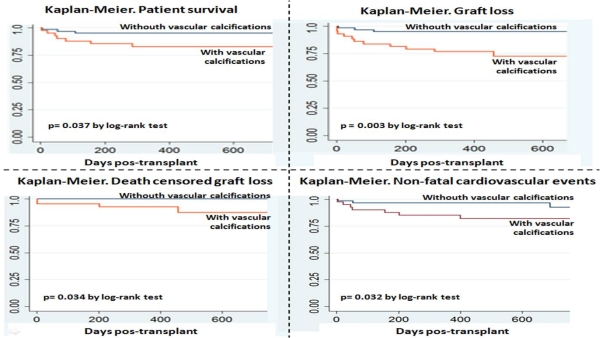Pretransplant Assessment of Vascular Calcification as a Risk Factor of Mortality, Graft Loss, and Cardiovascular Events in Renal Transplant Recipients
P. Munguia, R. Caramelo, M. Rubio, L. Sahdalá, L. Arnaudas, J. Paul, á. Blasco, L. Lou, M. Aladren, A. Sanjuan, A. Gutierrez-Dalmau.
Nephrology, Hospital Universitario Miguel Servet, Zaragoza, Spain.
Meeting: 2015 American Transplant Congress
Abstract number: A173
Keywords: Risk factors
Session Information
Session Name: Poster Session A: Kidney: Cardiovascular and Metabolic
Session Type: Poster Session
Date: Saturday, May 2, 2015
Session Time: 5:30pm-7:30pm
 Presentation Time: 5:30pm-7:30pm
Presentation Time: 5:30pm-7:30pm
Location: Exhibit Hall E
AIM: Cardiovascular events are the first cause of mortality in renal transplant recipients (RTRs), and their incidence is not only justified by the traditional CV risk factors. Although vascular calcifications (VCs) are an independent predictor of mortality in patients undergoing hemodialysis there are few studies about the impact of vascular calcification in RTRs and none of them evaluates Kauppila's Index (IK) as a predictor of patient and graft prognosis.
METHODS: All RTRs from 7/2011 to 9/2013 with a lateral lumbar radiography obtained immediately before to transplantation were included. Abdominal aortic calcifications (L4-S1) were graded by IK. Patients were classified in 2 groups; absence (IK =0-2) and presence (IK=3-24) of VCs before transplantation. We analyzed the impact of calcification on patient and graft survival, CV events, new onset DM, arterial hypertension, GFR and mineral metabolism.
RESULTS: VCs were observed in 68 of 115 incident RTRs (59.4%) before renal transplantation. RTRs and donors in the group with vascular calcifications were older, but there were no other pretransplant differences between groups. Patient mortality, graft loss and death censored graft loss were higher in RTRs with VCs (p= 0.037, p = 0.003 and p= 0.034 respectively), and a higher incidence of major cardiovascular events in the group with preexisting calcification was observed (p= 0.032). 
In the multivariable analysis, VCs were not an independent predictor for mortality (HR 3.46, p=0.074, 95% CI: 0.9-13.6) nor non-fatal cardiovascular events (HR 3.14, p=0.09, 95% CI: 0.8-12.2). although this might be due to the limited number of events.
CONCLUSION: Pretransplant KI correlates with graft and patient survival, as well as with major cardiovascular events following renal transplantation. A simple and low cost assessment of subclinical vascular disease by KI could provide an additional measure to accurate risk stratification of RTRs before kidney transplantation.
To cite this abstract in AMA style:
Munguia P, Caramelo R, Rubio M, Sahdalá L, Arnaudas L, Paul J, Blasco á, Lou L, Aladren M, Sanjuan A, Gutierrez-Dalmau A. Pretransplant Assessment of Vascular Calcification as a Risk Factor of Mortality, Graft Loss, and Cardiovascular Events in Renal Transplant Recipients [abstract]. Am J Transplant. 2015; 15 (suppl 3). https://atcmeetingabstracts.com/abstract/pretransplant-assessment-of-vascular-calcification-as-a-risk-factor-of-mortality-graft-loss-and-cardiovascular-events-in-renal-transplant-recipients/. Accessed February 17, 2026.« Back to 2015 American Transplant Congress
